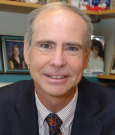I've witnessed incredible courage and zest for life among so many patients from so many walks of life—individuals committed to helping others in spite of their own adversity.
Forty years ago, when survival for patients with multiple myeloma was a matter of months, I knew that every person I sat down with was going to die, and probably die quickly, despite whatever I could try to do to help. As a young man who’d gone into medicine to make the world a better place, this was not an easy thing [to accept].
Looking back, it was my mentor at Johns Hopkins University School of Medicine, Dr. Richard Humphrey, who kept me from despairing. “Make science count for patients,” he insisted. “Treat patients as family. Make new discoveries that translate from the bench to the bedside to improve diagnosis, prognosis, and treatment of patients.” His words have been the center of my academic and clinical life ever since.
At Harvard Medical School’s Dana-Farber Cancer Institute, I’ve had the privilege of seeing the grim natural history of multiple myeloma brighten dramatically. We’ve moved from conventional chemotherapy when I began [practicing], to high-dose therapy and stem cell transplantation, to novel therapies that target the tumor in its microenvironment. Over the last decade, my team has made fundamental scientific discoveries that helped translate to clinical trials and FDA approval for eight new treatments. Our trainees have become the academic and clinical leaders in myeloma nationally and internationally. The ultimate benefit is that patients have now doubled or tripled their survival, and what was an incurable illness is, in many patients, chronic.
Potential for Cure on the Horizon
Targeting the cancer cell in its microenvironment has made the difference. When cancer cells are studied in a test tube, in vitro, you can determine whether certain drugs or treatments work. But tumor cells grow in vivo, in various organs (that is, a microenvironment or neighborhood). The microenvironment confers growth, survival, and drug resistance. In myeloma it’s the bone marrow. The challenge is validating new- targeted treatments that can kill the tumor cell in spite of all the advantages the microenvironment confers.
Making the World a Better Place
Today, there are classes of drugs that actually revolutionize the way we treat the tumor.
Cancer research is only half my story. I grew up in Auburn, a small town in central Massachusetts, and was the first in my family to graduate from college. My mother was a nurse; my father attended a trade school.
My ambition was to be a general practitioner (GP) in my hometown. To my parents, the values and the rewards of helping others were always paramount and never a one-way street. At the end of the day, their question was always, “What have you done to make the world a better place?”
Yes, research breakthroughs have obviously been critical in altering the terrible course of myeloma, but Dr. Richard Humphrey’s counsel to treat patients as family rings true all these years later.
I’ve learned my most important life lessons from my patients. Family and friends are the most important things. We, who are caregivers, must treasure health above all else. The clinic is where the research lab and real life run together. I’ve witnessed incredible courage and zest for life among so many patients from so many walks of life—individuals committed to helping others in spite of their own adversity who turn their own hardships into hope and opportunities for others and who serve as a personal inspiration to all of us in all that we do. There isn’t a day that goes by that I am not inspired.
I’ve been privileged to meet all kinds of patients, not only locally, but nationally and internationally as well—some of whom have been political, business, and sports leaders on the world stage. Cancer is a great equalizer. One common bond is that when cancer occurs, it happens not only to an individual but also to a family. Often, if the family is very close, it actually brings people closer together. The love and the warmth that is a bond for them grow even stronger. Sometimes, tragically, it becomes such a stress that the opposite happens: bonds break apart. Our challenge as practitioners is to help our patients adjust and deal with their illness personally, and also from a family point of view.
Forty years ago, I could not find words to comfort my patients or offer treatments that held any promise. Today, I’ll often say, “I’m sorry we have to talk about myeloma, but if you are going to have the cancer, this is the best time ever to have it. We have effective treatments now. New and even more promising therapies are coming.” I try to help them deal with the shock of such a life-altering illness, but I can realistically offer the promise of long life, quality of life, and the ability to have a family, see children and grandchildren grow up, and attend college graduations, weddings, and everything else.
To see patients enjoy the milestones of life with their families is the most wonderful reward I could have ever hoped for. The answer to my parents’ long-ago challenge is crystal clear. My patients make the world a better place. ■
Dr. Anderson is the Kraft Family Professor of Medicine at Harvard Medical School and Medical Director of the Kraft Family Blood Center at Dana-Farber Cancer Institute in Boston. “Family” is excerpted from The Big Casino (May, 2014) with permission from the book’s publishers, Stan Winokur, MD, and Vincent Coppola.
Additional essays from The Big Casino will be published in future issues of The ASCO Post.


